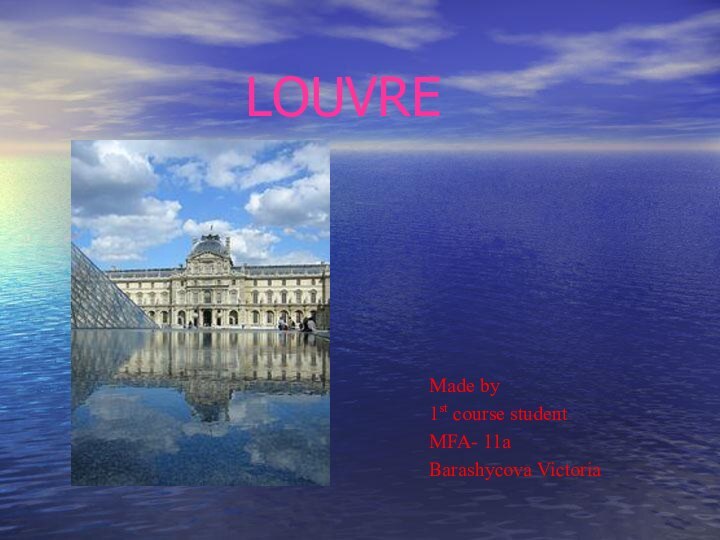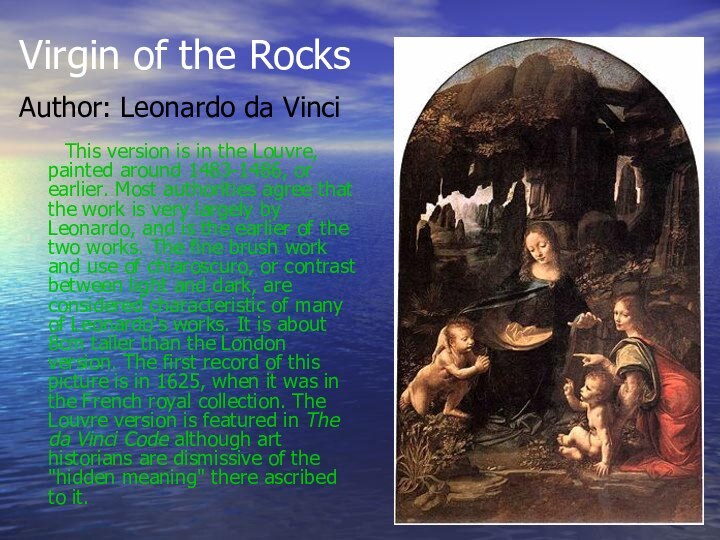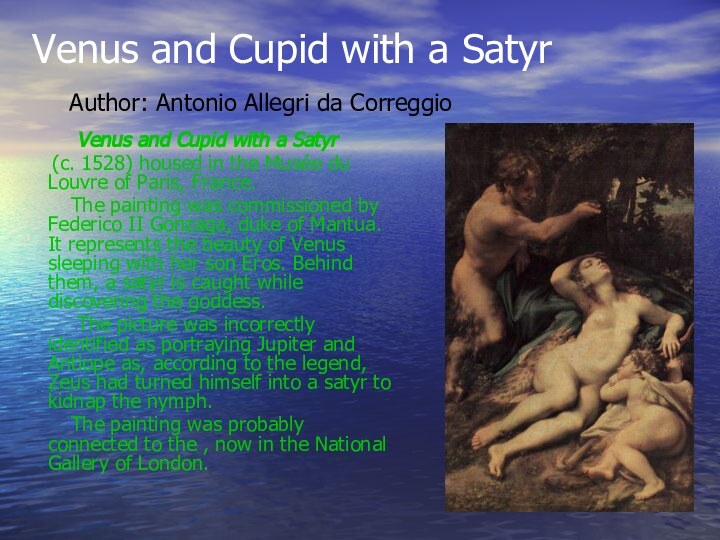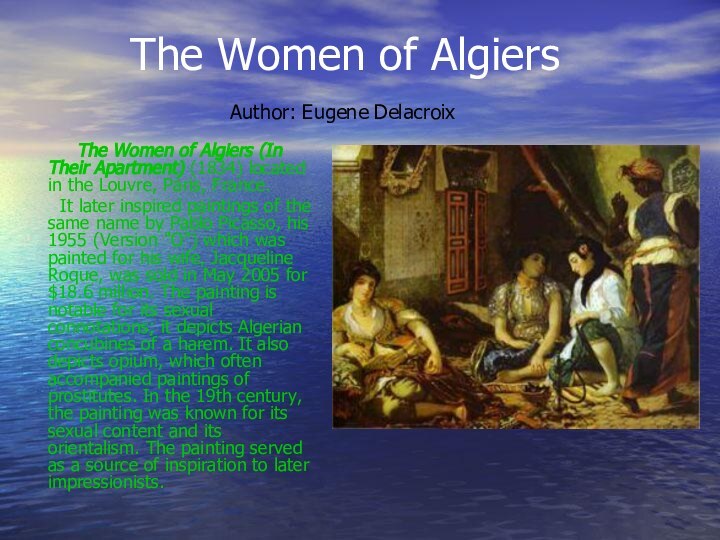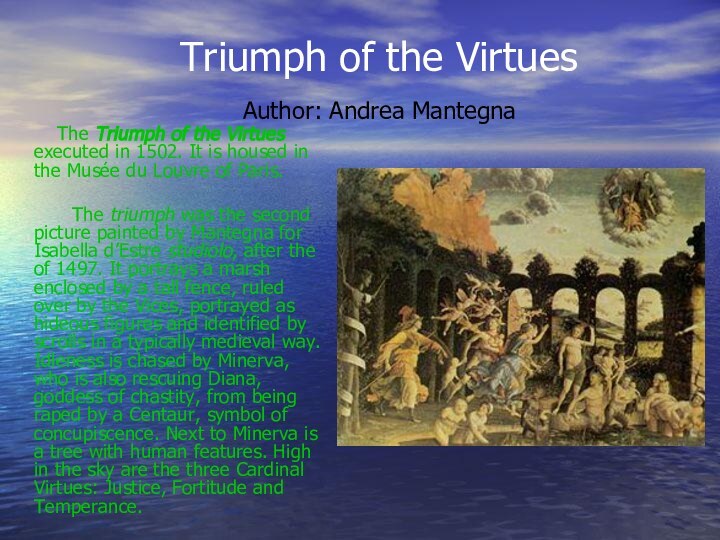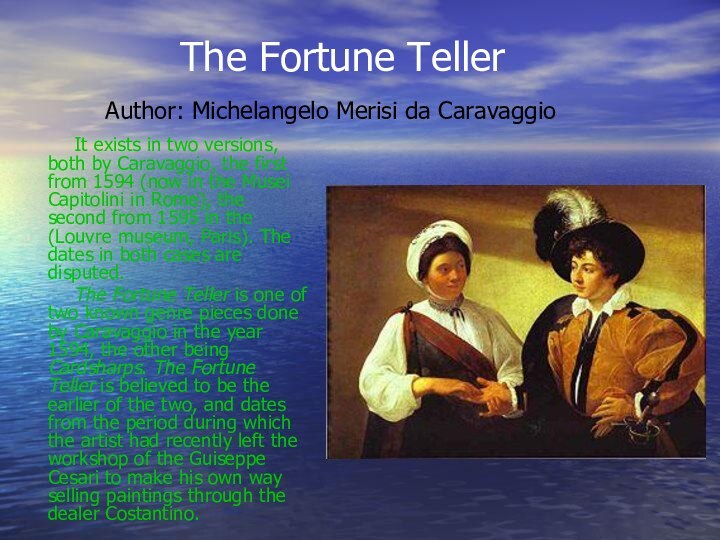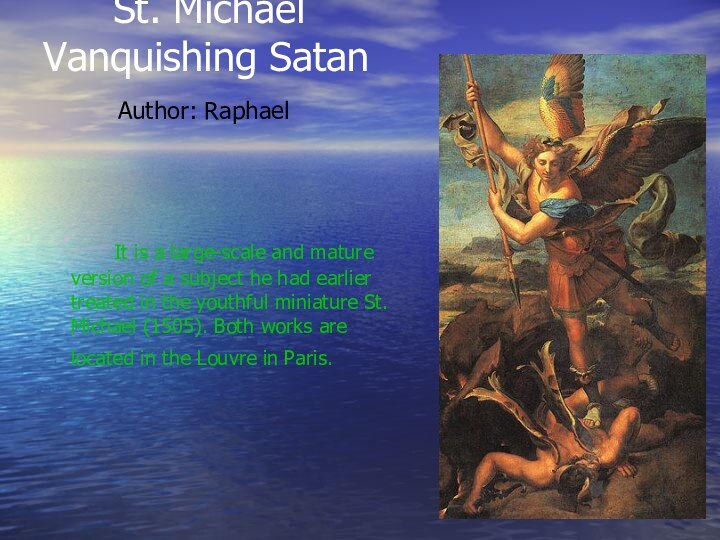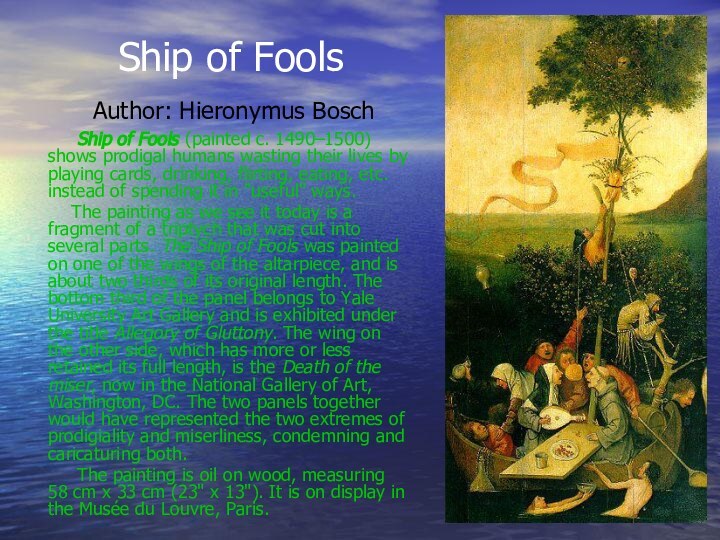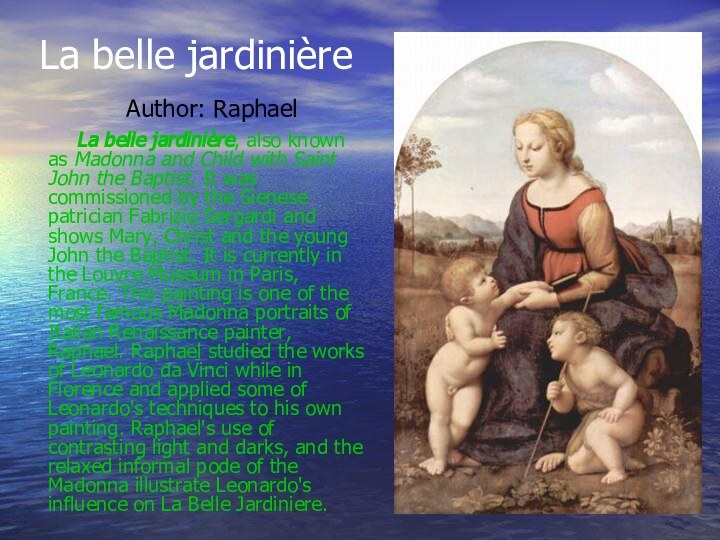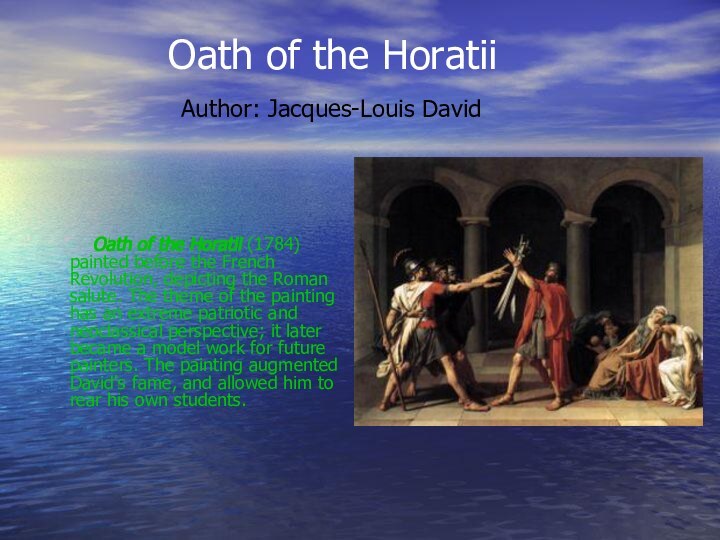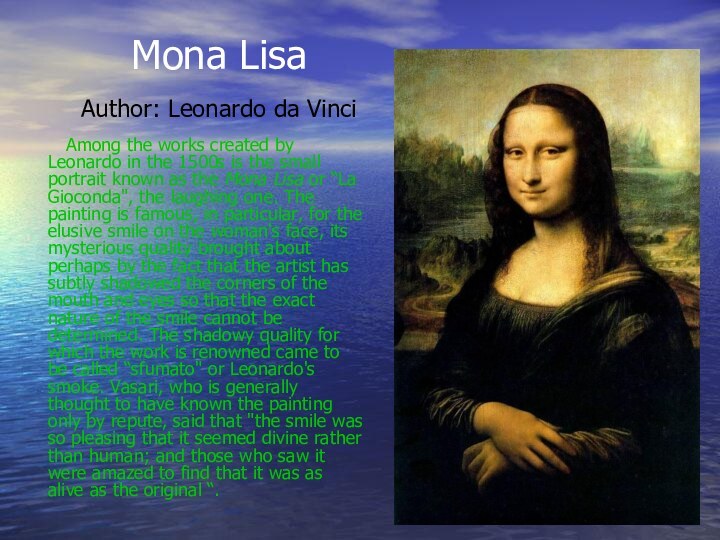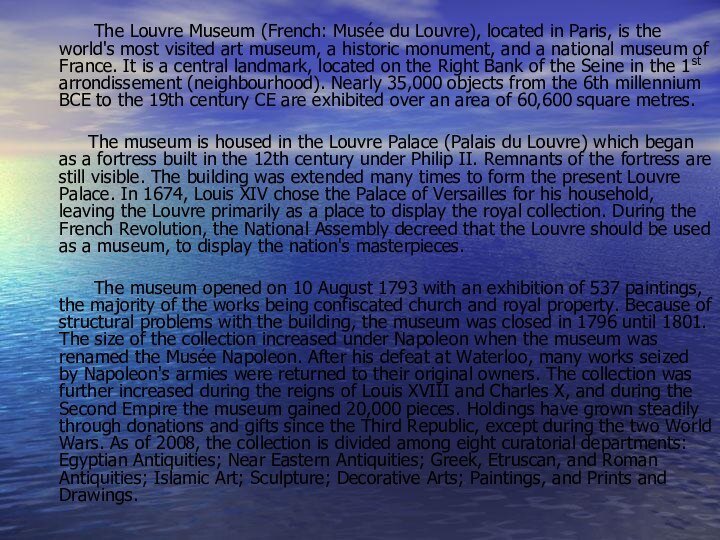
Louvre Museum (French: Musée du Louvre), located in Paris,
is the world's most visited art museum, a historic monument, and a national museum of France. It is a central landmark, located on the Right Bank of the Seine in the 1st arrondissement (neighbourhood). Nearly 35,000 objects from the 6th millennium BCE to the 19th century CE are exhibited over an area of 60,600 square metres.
The museum is housed in the Louvre Palace (Palais du Louvre) which began as a fortress built in the 12th century under Philip II. Remnants of the fortress are still visible. The building was extended many times to form the present Louvre Palace. In 1674, Louis XIV chose the Palace of Versailles for his household, leaving the Louvre primarily as a place to display the royal collection. During the French Revolution, the National Assembly decreed that the Louvre should be used as a museum, to display the nation's masterpieces.
The museum opened on 10 August 1793 with an exhibition of 537 paintings, the majority of the works being confiscated church and royal property. Because of structural problems with the building, the museum was closed in 1796 until 1801. The size of the collection increased under Napoleon when the museum was renamed the Musée Napoleon. After his defeat at Waterloo, many works seized by Napoleon's armies were returned to their original owners. The collection was further increased during the reigns of Louis XVIII and Charles X, and during the Second Empire the museum gained 20,000 pieces. Holdings have grown steadily through donations and gifts since the Third Republic, except during the two World Wars. As of 2008, the collection is divided among eight curatorial departments: Egyptian Antiquities; Near Eastern Antiquities; Greek, Etruscan, and Roman Antiquities; Islamic Art; Sculpture; Decorative Arts; Paintings, and Prints and Drawings.
Слайд 3
Virgin of the Rocks
Author: Leonardo da
Vinci
This version is in
the Louvre, painted around 1483-1486, or earlier. Most authorities agree that the work is very largely by Leonardo, and is the earlier of the two works. The fine brush work and use of chiaroscuro, or contrast between light and dark, are considered characteristic of many of Leonardo's works. It is about 8cm taller than the London version. The first record of this picture is in 1625, when it was in the French royal collection. The Louvre version is featured in The da Vinci Code although art historians are dismissive of the "hidden meaning" there ascribed to it.
Слайд 4
Venus and Cupid with a Satyr
Author: Antonio Allegri da Correggio
Venus and Cupid with a Satyr
(c. 1528) housed in the Musée du Louvre of Paris, France.
The painting was commissioned by Federico II Gonzaga, duke of Mantua. It represents the beauty of Venus sleeping with her son Eros. Behind them, a satyr is caught while discovering the goddess.
The picture was incorrectly identified as portraying Jupiter and Antiope as, according to the legend, Zeus had turned himself into a satyr to kidnap the nymph.
The painting was probably connected to the , now in the National Gallery of London.
Слайд 5
The Women of Algiers
Author:
Eugene Delacroix
The Women of Algiers (In Their Apartment) (1834) located in the Louvre, Paris, France.
It later inspired paintings of the same name by Pablo Picasso, his 1955 (Version "O") which was painted for his wife, Jacqueline Roque, was sold in May 2005 for $18.6 million. The painting is notable for its sexual connotations; it depicts Algerian concubines of a harem. It also depicts opium, which often accompanied paintings of prostitutes. In the 19th century, the painting was known for its sexual content and its orientalism. The painting served as a source of inspiration to later impressionists.
the Virtues
Author: Andrea Mantegna
The Triumph of the Virtues executed in 1502. It is housed in the Musée du Louvre of Paris.
The triumph was the second picture painted by Mantegna for Isabella d’Estre studiolo, after the of 1497. It portrays a marsh enclosed by a tall fence, ruled over by the Vices, portrayed as hideous figures and identified by scrolls in a typically medieval way. Idleness is chased by Minerva, who is also rescuing Diana, goddess of chastity, from being raped by a Centaur, symbol of concupiscence. Next to Minerva is a tree with human features. High in the sky are the three Cardinal Virtues: Justice, Fortitude and Temperance.
Teller
Author: Michelangelo Merisi da Caravaggio
It exists in two versions, both by Caravaggio, the first from 1594 (now in the Musei Capitolini in Rome), the second from 1595 in the (Louvre museum, Paris). The dates in both cases are disputed.
The Fortune Teller is one of two known genre pieces done by Caravaggio in the year 1594, the other being Cardsharps. The Fortune Teller is believed to be the earlier of the two, and dates from the period during which the artist had recently left the workshop of the Guiseppe Cesari to make his own way selling paintings through the dealer Costantino.
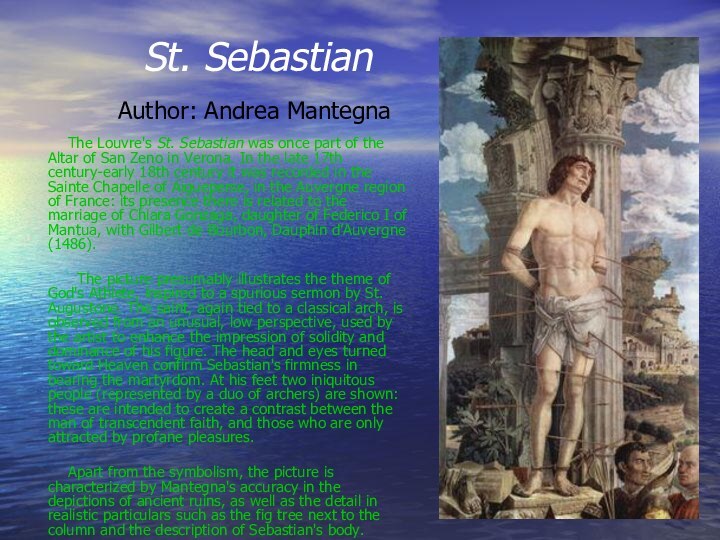
Author: Andrea Mantegna
The
Louvre's St. Sebastian was once part of the Altar of San Zeno in Verona. In the late 17th century-early 18th century it was recorded in the Sainte Chapelle of Aigueperse, in the Auvergne region of France: its presence there is related to the marriage of Chiara Gonzaga, daughter of Federico I of Mantua, with Gilbert de Bourbon, Dauphin d’Auvergne (1486).
The picture presumably illustrates the theme of God's Athlete, inspired to a spurious sermon by St. Augustone. The saint, again tied to a classical arch, is observed from an unusual, low perspective, used by the artist to enhance the impression of solidity and dominance of his figure. The head and eyes turned toward Heaven confirm Sebastian's firmness in bearing the martyrdom. At his feet two iniquitous people (represented by a duo of archers) are shown: these are intended to create a contrast between the man of transcendent faith, and those who are only attracted by profane pleasures.
Apart from the symbolism, the picture is characterized by Mantegna's accuracy in the depictions of ancient ruins, as well as the detail in realistic particulars such as the fig tree next to the column and the description of Sebastian's body.
Слайд 9
St. Michael
Vanquishing Satan
Author: Raphael
It is
a large-scale and mature version of a subject he had earlier treated in the youthful miniature St. Michael (1505). Both works are located in the Louvre in Paris.
Author: Hieronymus Bosch
Ship of
Fools (painted c. 1490–1500) shows prodigal humans wasting their lives by playing cards, drinking, flirting, eating, etc. instead of spending it in "useful" ways.
The painting as we see it today is a fragment of a triptych that was cut into several parts. The Ship of Fools was painted on one of the wings of the altarpiece, and is about two thirds of its original length. The bottom third of the panel belongs to Yale University Art Gallery and is exhibited under the title Allegory of Gluttony. The wing on the other side, which has more or less retained its full length, is the Death of the miser, now in the National Gallery of Art, Washington, DC. The two panels together would have represented the two extremes of prodigiality and miserliness, condemning and caricaturing both.
The painting is oil on wood, measuring 58 cm x 33 cm (23" x 13"). It is on display in the Musée du Louvre, Paris.
Слайд 11
La belle jardinière
Author: Raphael
La belle jardinière,
also known as Madonna and Child with Saint John the Baptist. It was commissioned by the Sienese patrician Fabrizio Sergardi and shows Mary, Christ and the young John the Baptist. It is currently in the Louvre Museum in Paris, France. This painting is one of the most famous Madonna portraits of Italian Renaissance painter, Raphael. Raphael studied the works of Leonardo da Vinci while in Florence and applied some of Leonardo's techniques to his own painting. Raphael's use of contrasting light and darks, and the relaxed informal pode of the Madonna illustrate Leonardo's influence on La Belle Jardiniere.
Слайд 12
Death of the Virgin
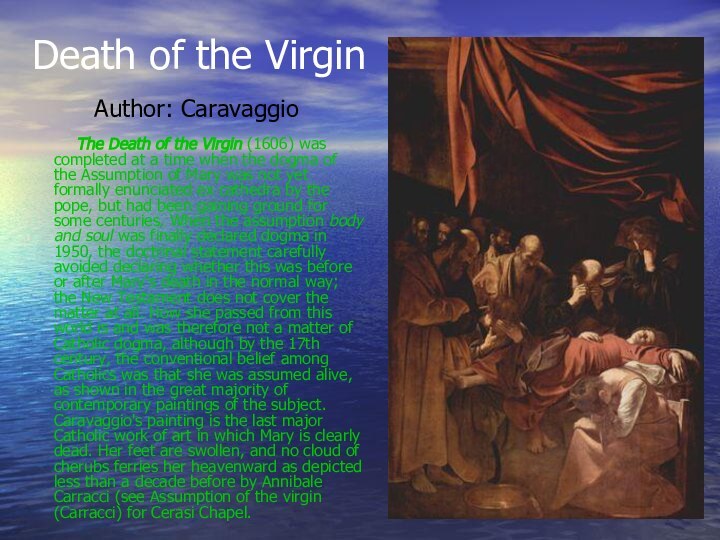
Author: Caravaggio
The Death
of the Virgin (1606) was completed at a time when the dogma of the Assumption of Mary was not yet formally enunciated ex cathedra by the pope, but had been gaining ground for some centuries. When the assumption body and soul was finally declared dogma in 1950, the doctrinal statement carefully avoided declaring whether this was before or after Mary's death in the normal way; the New Testament does not cover the matter at all. How she passed from this world is and was therefore not a matter of Catholic dogma, although by the 17th century, the conventional belief among Catholics was that she was assumed alive, as shown in the great majority of contemporary paintings of the subject. Caravaggio's painting is the last major Catholic work of art in which Mary is clearly dead. Her feet are swollen, and no cloud of cherubs ferries her heavenward as depicted less than a decade before by Annibale Carracci (see Assumption of the virgin (Carracci) for Cerasi Chapel.
Слайд 13
Christ at the Column
Author:
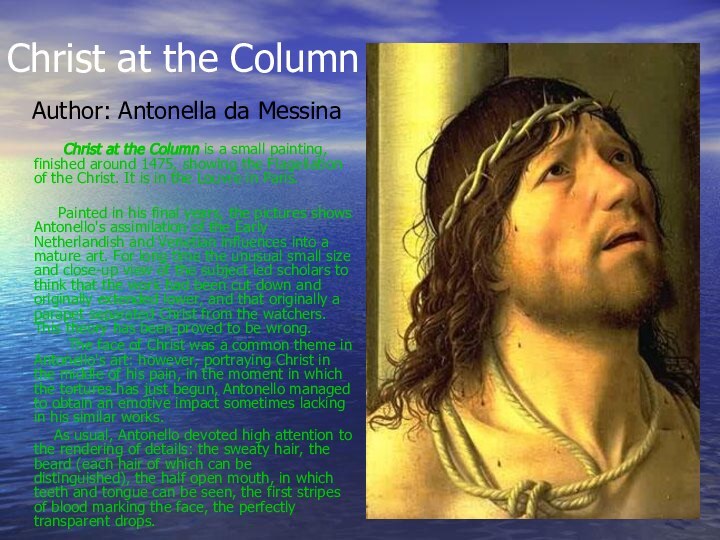
Antonella da Messina
Christ at the Column is a small painting, finished around 1475, showing the Flagellation of the Christ. It is in the Louvre in Paris.
Painted in his final years, the pictures shows Antonello's assimilation of the Early Netherlandish and Venetian influences into a mature art. For long time the unusual small size and close-up view of the subject led scholars to think that the work had been cut down and originally extended lower, and that originally a parapet separated Christ from the watchers. This theory has been proved to be wrong.
The face of Christ was a common theme in Antonello's art: however, portraying Christ in the middle of his pain, in the moment in which the tortures has just begun, Antonello managed to obtain an emotive impact sometimes lacking in his similar works.
As usual, Antonello devoted high attention to the rendering of details: the sweaty hair, the beard (each hair of which can be distinguished), the half open mouth, in which teeth and tongue can be seen, the first stripes of blood marking the face, the perfectly transparent drops.
Horatii
Author: Jacques-Louis
David
Oath of the Horatii (1784) painted before the French Revolution, depicting the Roman salute. The theme of the painting has an extreme patriotic and neoclassical perspective; it later became a model work for future painters. The painting augmented David's fame, and allowed him to rear his own students.
